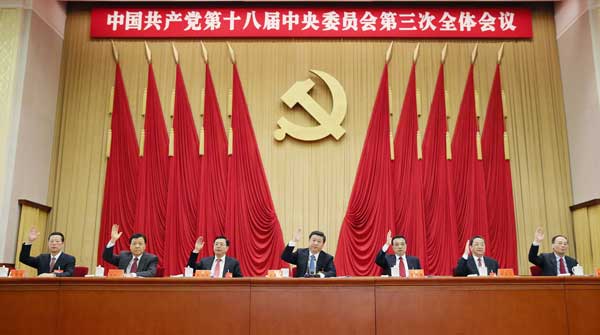 |
| LAN HONGGUANG / XINHUA |
Modernization of 'governance system' AND 'governance capability' envisioned in plan
China is to commission a specialized high-level group to design and coordinate the country's "great revolution" of reform and opening-up. The move comes 10 years after the ministry-level economic reform commission was merged with the former State planning commission into the National Development and Reform Commission.
The new Central Reform Leading Group is likely to be an even higher-level body than the former economic reform commission, think-tank researchers said.
The new leading group will probably be positioned at the same level as the Central Finance and Economy Leading Group, said Liu Fuhuan, from the Academy of Macroeconomic Research under the National Development and Reform Commission.
Part of the new group's duties, apart from economic reform, is to plan and carry out reform on modernizing China's "governance system" and "governance capability".
These two new concepts were raised at the Third Plenary Session of the 18th Communist Party of China Central Committee, a four-day meeting that ended in Beijing on Tuesday.
Wang Yukai, a professor at the Chinese Academy of Governance, said administrative reform will be a major component in China's next round of reform, adding that it will also result in less interference with the market.
In a communique that mentioned the word "market" 22 times, Chinese leaders attributed the "decisive role" of the market economy in allocating resources. The communique pledged to speed up the building of China's modern market system, its macroeconomic stewardship and its open economic system.
It also vowed to speed up transition of the economy's growth model and promote innovation to facilitate China's more efficient, more equitable and more sustainable development.
The core issue of the reform, as pointed out in the communique, is to "better handle the relationship between government and the market".
While regarding reform of the economic system as the key part of a broader reform agenda, the communique calls for "letting the market play a decisive role in allocating resources, while letting the government play its part better".
The role of the market has been taken to an unprecedented level in China since it adopted a socialist market economy in 1993, when the Party tentatively defined the market's role as "basic" in allocating resources.
The unprecedented emphasis is expected to bring more market vitality, competition and equal access in otherwise monopolized sectors, analysts said.
Zhang Zhuoyuan, an economist at the Chinese Academy of Social Sciences who attended the meeting, regards the "decisive role of the market" as the most important reform mentioned in the communique.
"It is apparent the market will gain more say in the allocation of resources, while less room is left for the government," he said.
Zhang said the meeting only set a broad reform agenda. Ministries and other administrative authorities will work out details to set the reforms in motion.
|
|
|
|
|
|
|
|
